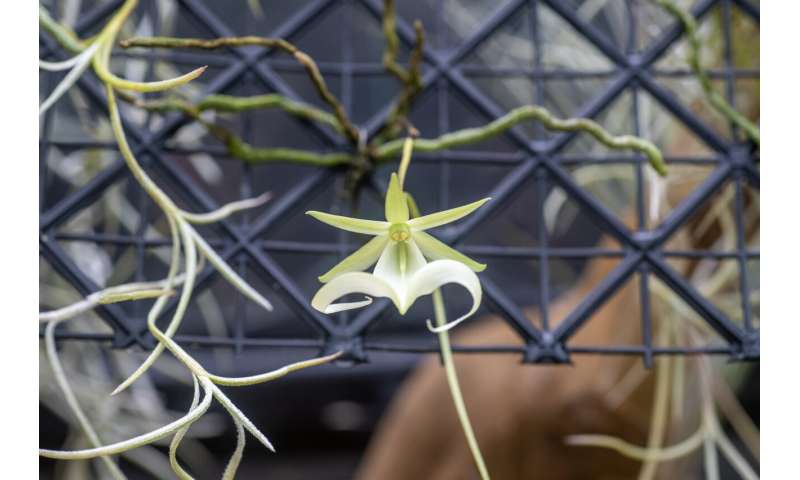Rare Florida ghost orchid flowers in UK for first time ever

The rare and endangered Florida ghost orchid (Dendrophylax lindenii) has flowered in the U.K. for the first time. The orchid bud has been on show at the Chelsea Flower Show in an Orchid Conservation Display created by a collaboration between J.P. Wright Company of Florida, GrowTropicals UK, the Royal Botanic Gardens, Kew and other organizations.
Professor Mike Fay, senior research leader at RBG Kew, says, "This is a wonderful example of a successful collaborative conservation project, with several universities and botanic gardens in the U.S. working together for the greater good, highlighting the importance of orchid conservation around the world."
Following its time at Chelsea, the orchid has been donated to Kew Gardens in London, where it is on display for visitors to see it as it flowers, in the Princess of Wales Conservatory. This particular Florida ghost orchid was cultivated, not removed from the wild, and began its life as a seed which was germinated in Dr. Mike Kane's lab at the University of Florida on 14 September 2014, from seed obtained from the Florida Panther National Wildlife Refuge.
Upon his retirement, Dr. Kane donated many of these seedlings to the Naples Botanical Gardens and Chicago Botanic Garden. The ghost orchid now on display at Kew Gardens came from a plant nurtured by Johanna Hutchins, Orchid floriculturist at Chicago Botanic Garden.
Dendrophylax lindenii is commonly known in America as the ghost orchid and is surrounded by an air of mystery and intrigue. These leafless orchids bloom in the dark and shadows in Cuba and South Florida and once open the flowers possess a beautiful fragrance which is only released at night. The fragrance attracts hawkmoths with tongues long enough to reach the nectar at the base of the long spur; these visits result in pollination.
Dendrophylax means "tree guardian," and the roots wrap themselves protectively around the trunk of their host tree. Ghost orchid populations in Florida were decimated when their host trees, majestic 1,000-year-old Taxodium distichum (bald cypress), were logged in World War II to provide lumber for aircraft carrier decks in the Pacific. Only around 1,500 Dendrophylax lindenii plants remain in South Florida and fewer than 500 are found in Cuba. The species is recorded as Endangered on IUCN Red List of Threatened Species.
Under threat
Habitat destruction and illegal poaching of plants are among the leading causes for the decline of the remaining ghost orchid populations This display at Kew Gardens aims to highlight the critical role which orchids play in ecosystems globally and the pressing need to conserve them. Drawing on expertise from RBG Kew and partner organizations, visitors to the Princess of Wales Conservatory can learn more about recent efforts to find and protect the rare Florida ghost orchid, along with other rare and endangered orchids which make up Kew's living collection.
Why orchids matter to the environment
Orchids are considered the canary in the coal mine for extinction, as they are extremely sensitive to changes in the environment and their disappearance from an area is often seen as an indicator of poor ecosystem health. Each year, Kew Gardens celebrates this important group of species with its famous Orchid Festival, in which the Princess of Wales Conservatory is adorned with more than 5,000 orchids displayed in innovative designs and sculptures. This year's display was inspired by the beauty and biodiversity of Cameroon, a country that is home to 450 species of orchid—some so rare their locations must be kept secret for their own protection.
RBG Kew and orchids
Dating back to at least 1787, RBG Kew has one of the oldest collections of living tropical orchids in the world, as well as the largest Orchid Herbarium, which holds more than 400,000 preserved specimens. Today, RBG Kew's living orchid collection contains about 8,000 plants, representing approximately 1,300 species. With some species now thought to be extinct in the wild, RBG Kew's collection of living and preserved orchids is an invaluable resource for the scientific community, but the care of the collection falls to Kew's team of skilled horticulturists, demonstrating the interconnection between horticulture and science.
As one of the most biodiverse places in the world, RBG Kew is uniquely positioned as a center of excellence in the application of scientific knowledge about plants, and it is this relationship that underpins Kew's core purpose. Our major research projects include conservation genetics of rare orchid species and studies of the factors that lead to the amazing diversity of orchid species.
Provided by Royal Botanic Gardens, Kew